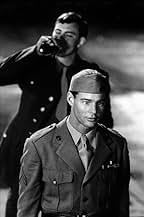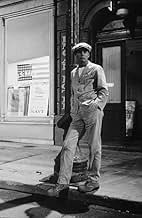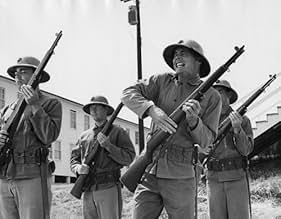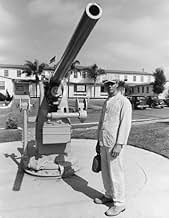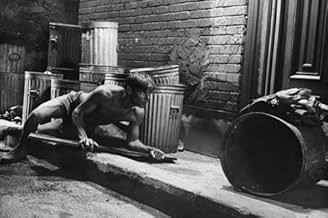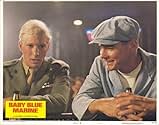Füge eine Handlung in deiner Sprache hinzuA Marine recruit fails basic training and is sent home wearing the "baby blue" fatigues of a washout. En route, he's mugged by a battle-fatigued Marine Raider who leaves him to hitch-hike ho... Alles lesenA Marine recruit fails basic training and is sent home wearing the "baby blue" fatigues of a washout. En route, he's mugged by a battle-fatigued Marine Raider who leaves him to hitch-hike home wearing the hero's uniform left by the Raider.A Marine recruit fails basic training and is sent home wearing the "baby blue" fatigues of a washout. En route, he's mugged by a battle-fatigued Marine Raider who leaves him to hitch-hike home wearing the hero's uniform left by the Raider.
- Regie
- Drehbuch
- Hauptbesetzung
Bruno Kirby
- Pop Mosley
- (as B. Kirby Jr.)
Kenneth Tobey
- Buick Driver
- (as Ken Tobey)
Empfohlene Bewertungen
I first saw this film while stationed in Germany, and I especially enjoyed the scenery, music, and the plot. The timeless standard, "I'll be seeing you", added greatly to the mood. A very imaginative, and sensitive kind of movie for all to enjoy.
Staying up late one night, I accidentally caught this movie on TV. I had been looking for it since I'm a Richard Gere fan but hadn't had any luck. Good thing I didn't buy it or anything.
That said, it's not bad. But it certainly isn't very good. Vincent is sent home from the army and once he arrives in a small town, folks there mistake him for some sort of war hero. And he goes along for the ride, for a while anyway. Gere plays a soldier who at one point steals Vincent's clothes.
Harmless, that's probably the best word I can think of for this movie. I wasn't bored and I wasn't thrilled either. It went by easily (very short film), and I've mostly forgotten about it now, but I guess I wouldn't mind watching it again someday. If I couldn't think of anything else, that is.
One advice; don't watch it for Gere alone. His role is very short, but he's got blond hair here, very funny.
That said, it's not bad. But it certainly isn't very good. Vincent is sent home from the army and once he arrives in a small town, folks there mistake him for some sort of war hero. And he goes along for the ride, for a while anyway. Gere plays a soldier who at one point steals Vincent's clothes.
Harmless, that's probably the best word I can think of for this movie. I wasn't bored and I wasn't thrilled either. It went by easily (very short film), and I've mostly forgotten about it now, but I guess I wouldn't mind watching it again someday. If I couldn't think of anything else, that is.
One advice; don't watch it for Gere alone. His role is very short, but he's got blond hair here, very funny.
Jan-Michael Vincent plays a "Baby Blue Marine" (i.e., a Marine boot camp failure) during World War II. He's initially sent home in disgrace after just five weeks--wearing baby blue fatigues--until he's knocked unconscious (by a white-haired Richard Gere), forcing him into a different uniform: that of a Raider Marine. Original screenplay by Stanford Whitmore opens with a hilarious loser's outfit overseen by an incredulous drill instructor (Michael Conrad, who's terrific). The rest of the film isn't quite so good, especially with Whitmore's overripe narrative playing out like a Preston Sturges wannabe accented with barracks talk, introspective drama, and curlicues of wobbly comedy. Vincent (laying on the sensitive soul routine) isn't the recruit I wanted to follow, anyway; that honor would go to Bruno Kirby (B. Kirby Jr.) as a fake bed-wetter who just wants to get home to his lonely wife. **1/2 from ****
Very appealing stateside WWII drama stars then-hot Jan-Michael Vincent as Marion "Hedge" Hedgepeth, who, before long, flunks out of his basic training as a Marine, and is sent home in a baby blue uniform in disgrace. During the journey, he encounters an actual young veteran (Richard Gere, in a memorable bit) who's desperate to avoid being sent back into battle. So the vet mugs Hedge (well, so to speak...he actually LEAVES him a few dollars), and all Hedge has to wear is the vets' uniform. On his way back home, he stops in a small Colorado town, and is naturally thought to be a war hero by the locals. He's so endearing to them, and they to him, that he can't bring himself to tell them the truth.
Written by Stanford Whitmore ("Hammersmith Is Out", "The Dark"), and directed by John D. Hancock ("Let's Scare Jessica to Death", "Bang the Drum Slowly"), this is an enjoyable little film worth rediscovering. While not altogether believable (for some reason, there's a Japanese internment camp right in the woods near this town), it gets by on a certain amount of charm, just like its lead character. In fact, a citizen named Hudkins (Bert Remsen), with whose daughter Rose (Glynnis O'Connor) Hedge falls in love, surmises that he's too *nice* and *innocent* to seem like a hardened killer.
Overall, the film does get pretty dramatic, and takes on the tone of a fable, but it never veers too far into unpleasantness. Excellent location shooting in & near the California towns of Weed and McCloud gives it atmosphere and a fine feeling of Americana, and the score by Fred Karlin is excellent.
Vincent was then at the peak of his career as a leading man in film, and he couldn't be more likable. O'Connor is adorable as the romantic interest, and Katherine Helmond, Dana Elcar, Bert Remsen, Bruno Kirby, Gere (sporting shocking bleach blonde hair), Art Lund, Michael Conrad, Allan Miller, Kenneth Tobey, Lelia Goldoni, Marshall Efron, and Barton Heyman comprise a rock solid supporting cast. Adam Arkin has one of his earliest big screen roles as a boy named "Rupe".
Well worth a look, especially if you like cinema set during this period, or are a fan of Vincent.
Seven out of 10.
Written by Stanford Whitmore ("Hammersmith Is Out", "The Dark"), and directed by John D. Hancock ("Let's Scare Jessica to Death", "Bang the Drum Slowly"), this is an enjoyable little film worth rediscovering. While not altogether believable (for some reason, there's a Japanese internment camp right in the woods near this town), it gets by on a certain amount of charm, just like its lead character. In fact, a citizen named Hudkins (Bert Remsen), with whose daughter Rose (Glynnis O'Connor) Hedge falls in love, surmises that he's too *nice* and *innocent* to seem like a hardened killer.
Overall, the film does get pretty dramatic, and takes on the tone of a fable, but it never veers too far into unpleasantness. Excellent location shooting in & near the California towns of Weed and McCloud gives it atmosphere and a fine feeling of Americana, and the score by Fred Karlin is excellent.
Vincent was then at the peak of his career as a leading man in film, and he couldn't be more likable. O'Connor is adorable as the romantic interest, and Katherine Helmond, Dana Elcar, Bert Remsen, Bruno Kirby, Gere (sporting shocking bleach blonde hair), Art Lund, Michael Conrad, Allan Miller, Kenneth Tobey, Lelia Goldoni, Marshall Efron, and Barton Heyman comprise a rock solid supporting cast. Adam Arkin has one of his earliest big screen roles as a boy named "Rupe".
Well worth a look, especially if you like cinema set during this period, or are a fan of Vincent.
Seven out of 10.
I was actually around 13 years old camping near the McCloud River, near Shasta when this movie was being filmed. My family was paid to leave our campsite for the afternoon, when they filmed Vincent floating down the river. A little trivia...the scene where they pulled him out, was actually where he started his float down the river. And if the stunt man missed the netting, there was 20 foot waterfall about 1/4 mile down farther.
Anyway...I watched it at the time, and didn't get it. It wasn't until years later when I saw the movie and actually understood the meaning of it. It's pretty powerful movie and certainly a fine job by Jan at such a young age. His movie career never really took off as expected, but of course he later found success on TV. I wish this movie was available, cause I would love to see it again.
Anyway...I watched it at the time, and didn't get it. It wasn't until years later when I saw the movie and actually understood the meaning of it. It's pretty powerful movie and certainly a fine job by Jan at such a young age. His movie career never really took off as expected, but of course he later found success on TV. I wish this movie was available, cause I would love to see it again.
Wusstest du schon
- WissenswertesUncredited final theatrical feature film of John Drew Barrymore. After finishing this film he left the industry and became a recluse for the next 25 years.
- PatzerDuring the flag ceremony at the Japaneses Internment Camp, the wrong bugle call is sounded. Lowering the flag at the end of the day is called a "Retreat" ceremony. The bugle call played is, "Retreat", which is the first of two bugle calls that are sounded. When "Retreat" is sounded, it lets everyone know to stop what they're doing and face the flag. The salute isn't presented until the second bugle call, "To The Colors" begins as the flag is being lowered. In this movie, the bugle call, "To The Colors" is not played.
- VerbindungenFeatures Opfer einer großen Liebe (1939)
Top-Auswahl
Melde dich zum Bewerten an und greife auf die Watchlist für personalisierte Empfehlungen zu.
- How long is Baby Blue Marine?Powered by Alexa
Details
- Erscheinungsdatum
- Herkunftsland
- Sprache
- Auch bekannt als
- Парень из морской пехоты
- Drehorte
- Produktionsfirmen
- Weitere beteiligte Unternehmen bei IMDbPro anzeigen
Zu dieser Seite beitragen
Bearbeitung vorschlagen oder fehlenden Inhalt hinzufügen



